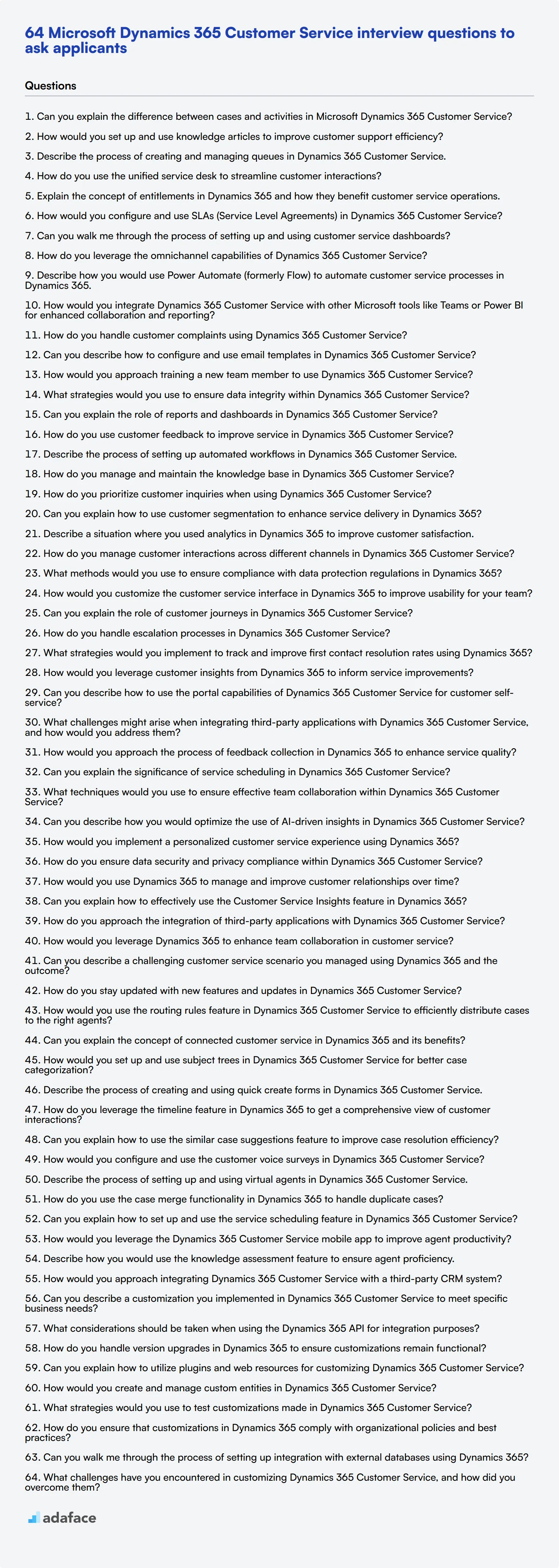Hiring the right Microsoft Dynamics 365 Customer Service specialists is crucial for organizations looking to optimize their customer relationship management. Asking the right interview questions helps assess candidates' knowledge, experience, and problem-solving skills in this specific domain.
This blog post provides a comprehensive list of interview questions categorized by experience level, from junior to senior specialists. It also includes questions focused on processes, features, integration, and customization aspects of Microsoft Dynamics 365 Customer Service.
By using these questions, recruiters and hiring managers can effectively evaluate candidates' expertise and find the best fit for their team. Consider combining these interview questions with a Microsoft Dynamics 365 Customer Service skills assessment for a more thorough evaluation process.
Table of contents
10 common Microsoft Dynamics 365 Customer Service interview questions to ask your applicants
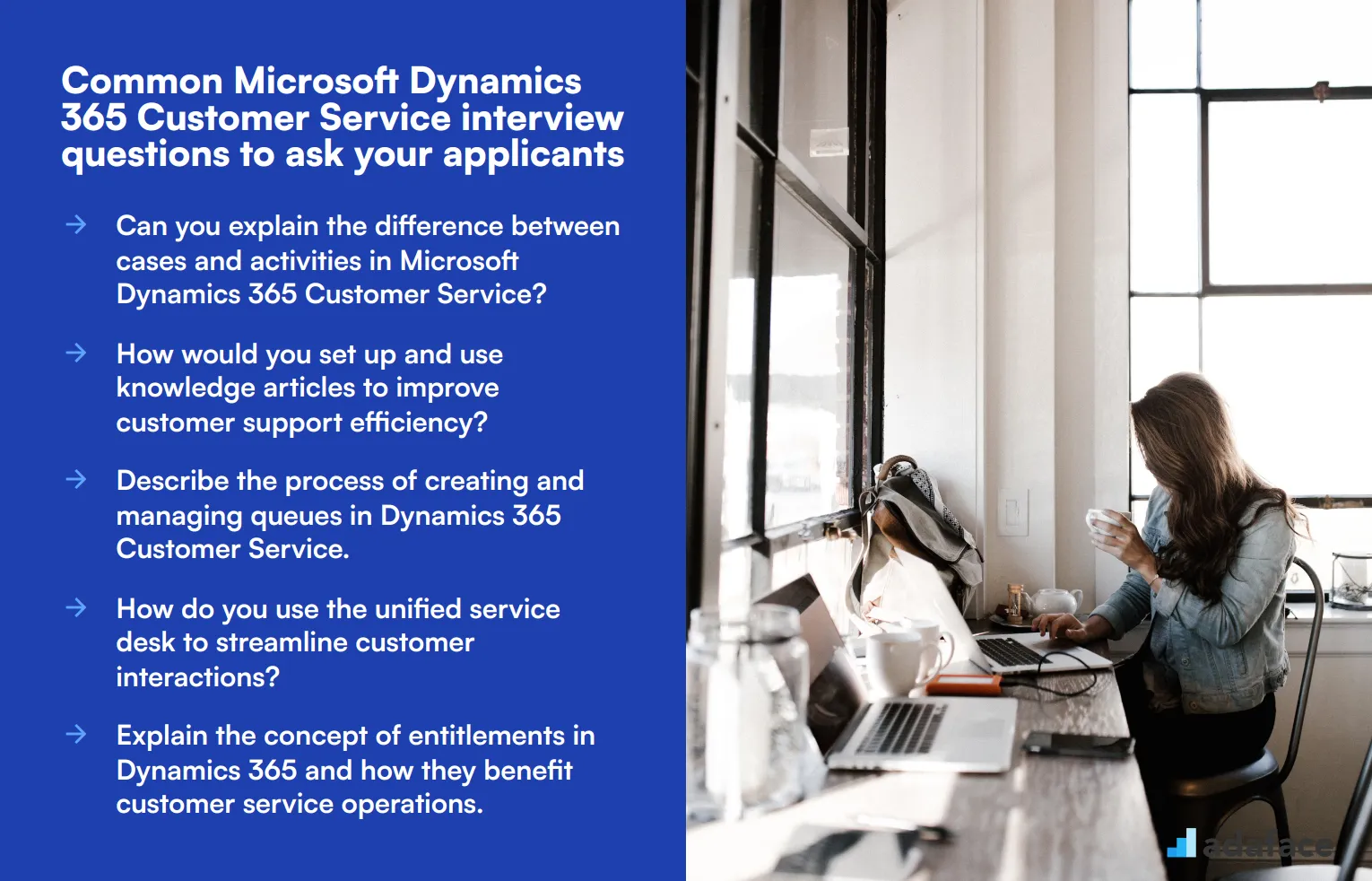
To assess your applicants' proficiency with Microsoft Dynamics 365 Customer Service and their customer service skills, use these 10 common interview questions. These questions will help you evaluate candidates' understanding of the platform's features and their ability to apply them in real-world scenarios.
- Can you explain the difference between cases and activities in Microsoft Dynamics 365 Customer Service?
- How would you set up and use knowledge articles to improve customer support efficiency?
- Describe the process of creating and managing queues in Dynamics 365 Customer Service.
- How do you use the unified service desk to streamline customer interactions?
- Explain the concept of entitlements in Dynamics 365 and how they benefit customer service operations.
- How would you configure and use SLAs (Service Level Agreements) in Dynamics 365 Customer Service?
- Can you walk me through the process of setting up and using customer service dashboards?
- How do you leverage the omnichannel capabilities of Dynamics 365 Customer Service?
- Describe how you would use Power Automate (formerly Flow) to automate customer service processes in Dynamics 365.
- How would you integrate Dynamics 365 Customer Service with other Microsoft tools like Teams or Power BI for enhanced collaboration and reporting?
8 Microsoft Dynamics 365 Customer Service interview questions and answers to evaluate junior Customer Service Specialists
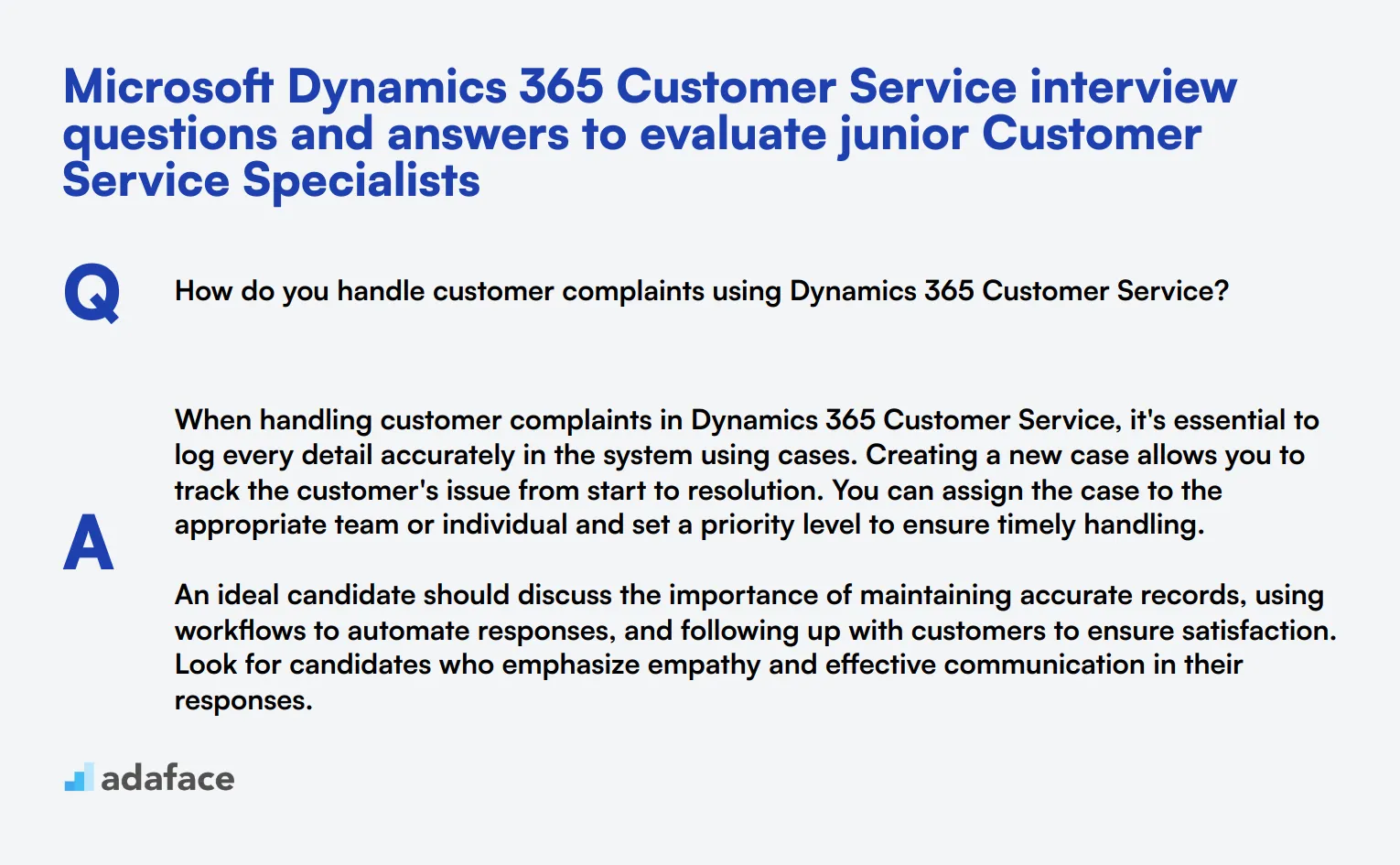
To identify whether candidates have a solid grasp of Microsoft Dynamics 365 Customer Service fundamentals, consider these interview questions. This list is perfect for evaluating junior Customer Service Specialists and ensuring they have the necessary skills and knowledge for the role.
1. How do you handle customer complaints using Dynamics 365 Customer Service?
When handling customer complaints in Dynamics 365 Customer Service, it's essential to log every detail accurately in the system using cases. Creating a new case allows you to track the customer's issue from start to resolution. You can assign the case to the appropriate team or individual and set a priority level to ensure timely handling.
An ideal candidate should discuss the importance of maintaining accurate records, using workflows to automate responses, and following up with customers to ensure satisfaction. Look for candidates who emphasize empathy and effective communication in their responses.
2. Can you describe how to configure and use email templates in Dynamics 365 Customer Service?
Email templates in Dynamics 365 Customer Service are useful for standardizing communication with customers. To configure them, navigate to the Settings area, select Templates, and then Email Templates. From there, you can create a new template, including dynamic fields to personalize each email.
A strong candidate will highlight the benefits of using email templates, such as saving time and ensuring consistent messaging. They should also mention how templates can be tailored to different scenarios, like follow-ups or issue resolutions.
3. How would you approach training a new team member to use Dynamics 365 Customer Service?
Training a new team member starts with a comprehensive overview of Dynamics 365 Customer Service features. This includes hands-on sessions for navigation, case management, and using dashboards. Pairing them with a mentor for real-time support can also be beneficial.
Candidates should emphasize the importance of continuous learning and regular check-ins to address any difficulties the new team member might face. Look for a structured training plan and the use of available resources, such as online tutorials and knowledge articles.
4. What strategies would you use to ensure data integrity within Dynamics 365 Customer Service?
Ensuring data integrity involves regular data audits, using validation rules, and educating users on proper data entry practices. Implementing workflows to automate data quality checks can help maintain accurate records.
Ideal candidates will discuss the importance of maintaining clean data to provide reliable insights and improve customer service efficiency. They should also mention using the system's built-in tools to enforce data consistency.
5. Can you explain the role of reports and dashboards in Dynamics 365 Customer Service?
Reports and dashboards in Dynamics 365 Customer Service provide valuable insights into performance metrics, such as case resolution times and customer satisfaction scores. They help managers make informed decisions and identify areas for improvement.
Candidates should highlight how they use these tools to track team performance and streamline operations. Look for examples of specific metrics they have monitored and how they addressed any identified issues.
6. How do you use customer feedback to improve service in Dynamics 365 Customer Service?
Customer feedback can be collected through surveys, direct interactions, and case resolutions. Using Dynamics 365, you can analyze this feedback to identify common issues and areas for improvement. Implementing changes based on this data helps enhance customer satisfaction.
A good response will include examples of how the candidate has used feedback in the past to make tangible improvements, emphasizing the importance of closing the feedback loop with customers.
7. Describe the process of setting up automated workflows in Dynamics 365 Customer Service.
Automated workflows in Dynamics 365 Customer Service streamline repetitive tasks and ensure consistency. To set up a workflow, navigate to the settings, select Processes, and create a new workflow. Define the triggers and actions, such as assigning cases or sending emails.
Look for candidates who understand the benefits of automation, like increased efficiency and reduced errors. They should explain how they have used workflows in previous roles to enhance productivity.
8. How do you manage and maintain the knowledge base in Dynamics 365 Customer Service?
Managing a knowledge base involves regularly updating articles, ensuring accuracy, and organizing content for easy access. It's crucial to review and revise articles based on customer interactions and feedback.
Candidates should describe their experience in maintaining a knowledge base and how they ensure it stays relevant and useful. Look for examples of how they've used the knowledge base to resolve customer queries quickly.
15 intermediate Microsoft Dynamics 365 Customer Service interview questions and answers to ask mid-tier Customer Service Specialists.
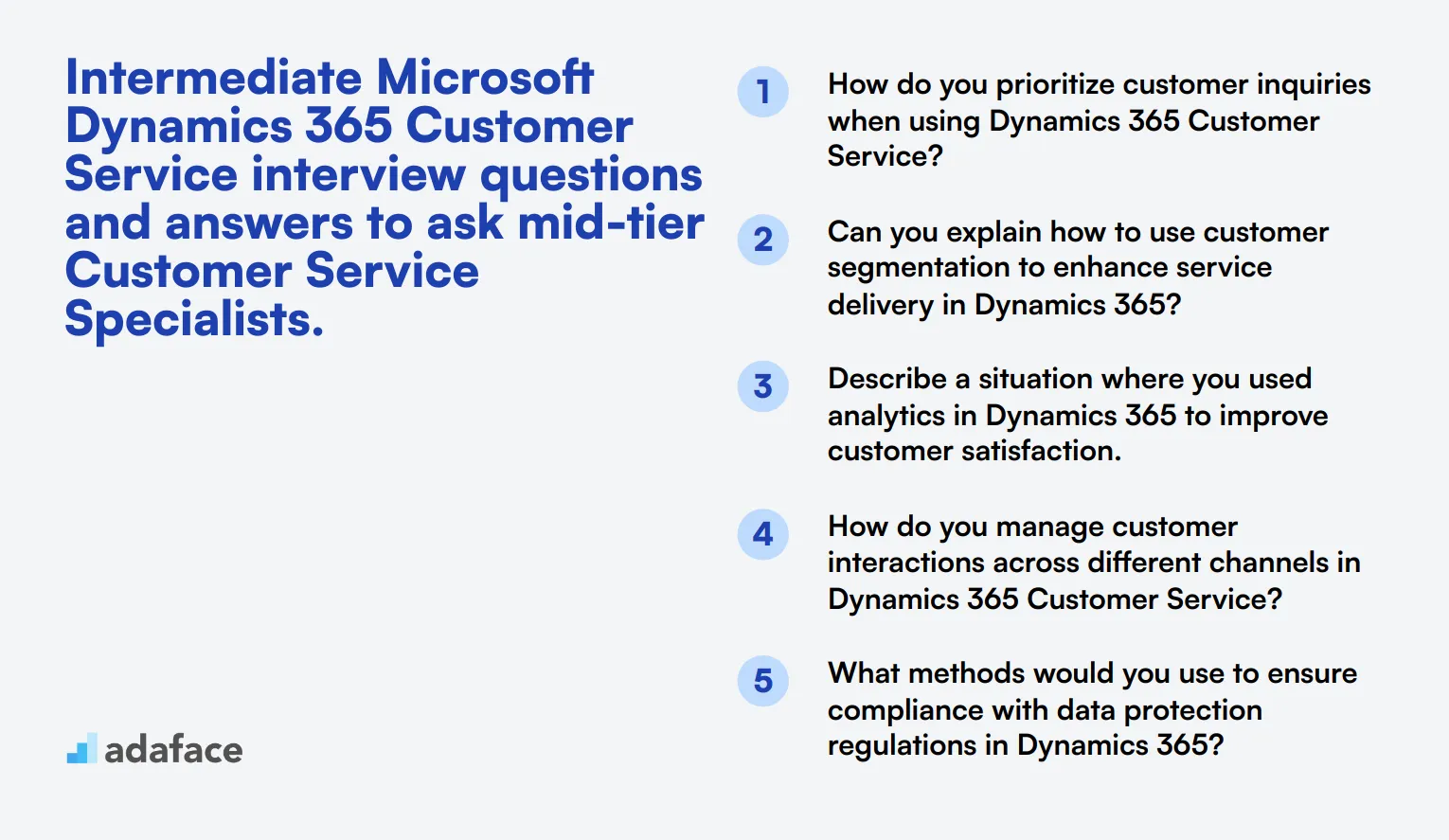
To assess the technical and process-oriented skills of mid-tier Customer Service Specialists, consider using these interview questions. They are designed to help you evaluate candidates' understanding and practical application of Microsoft Dynamics 365 Customer Service in real-world scenarios. For additional insights, you may want to check out our customer service manager job description.
- How do you prioritize customer inquiries when using Dynamics 365 Customer Service?
- Can you explain how to use customer segmentation to enhance service delivery in Dynamics 365?
- Describe a situation where you used analytics in Dynamics 365 to improve customer satisfaction.
- How do you manage customer interactions across different channels in Dynamics 365 Customer Service?
- What methods would you use to ensure compliance with data protection regulations in Dynamics 365?
- How would you customize the customer service interface in Dynamics 365 to improve usability for your team?
- Can you explain the role of customer journeys in Dynamics 365 Customer Service?
- How do you handle escalation processes in Dynamics 365 Customer Service?
- What strategies would you implement to track and improve first contact resolution rates using Dynamics 365?
- How would you leverage customer insights from Dynamics 365 to inform service improvements?
- Can you describe how to use the portal capabilities of Dynamics 365 Customer Service for customer self-service?
- What challenges might arise when integrating third-party applications with Dynamics 365 Customer Service, and how would you address them?
- How would you approach the process of feedback collection in Dynamics 365 to enhance service quality?
- Can you explain the significance of service scheduling in Dynamics 365 Customer Service?
- What techniques would you use to ensure effective team collaboration within Dynamics 365 Customer Service?
9 advanced Microsoft Dynamics 365 Customer Service interview questions and answers to evaluate senior Customer Service Specialists
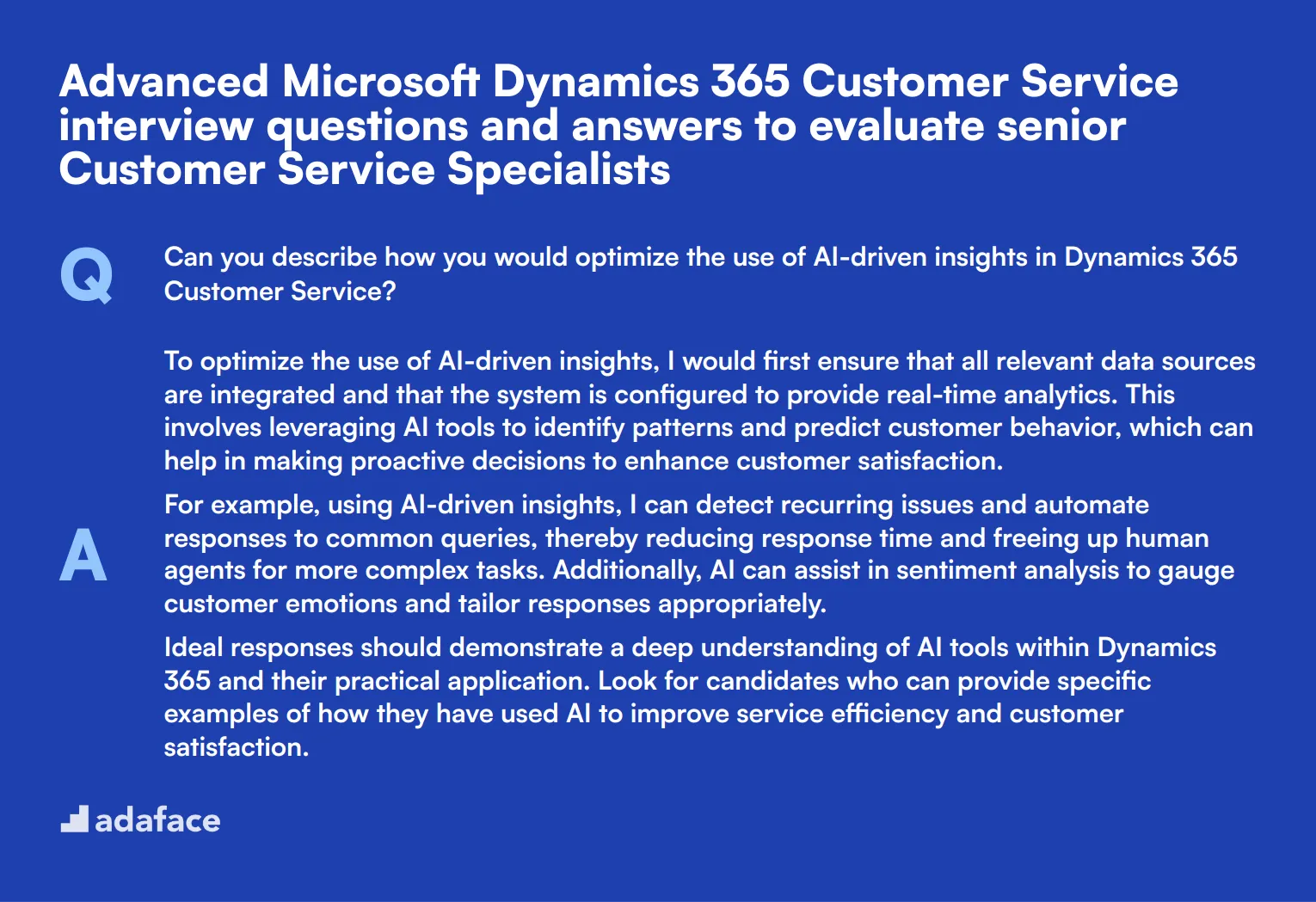
To evaluate whether your candidates are seasoned pros in Microsoft Dynamics 365 Customer Service, use these advanced interview questions. They're designed to help you dig deep into their expertise and assess their ability to handle complex scenarios.
1. Can you describe how you would optimize the use of AI-driven insights in Dynamics 365 Customer Service?
To optimize the use of AI-driven insights, I would first ensure that all relevant data sources are integrated and that the system is configured to provide real-time analytics. This involves leveraging AI tools to identify patterns and predict customer behavior, which can help in making proactive decisions to enhance customer satisfaction.
For example, using AI-driven insights, I can detect recurring issues and automate responses to common queries, thereby reducing response time and freeing up human agents for more complex tasks. Additionally, AI can assist in sentiment analysis to gauge customer emotions and tailor responses appropriately.
Ideal responses should demonstrate a deep understanding of AI tools within Dynamics 365 and their practical application. Look for candidates who can provide specific examples of how they have used AI to improve service efficiency and customer satisfaction.
2. How would you implement a personalized customer service experience using Dynamics 365?
Implementing a personalized customer service experience involves utilizing customer data to tailor interactions. In Dynamics 365, I would use the customer profiles and history features to gain insights into customer preferences and past interactions.
This includes configuring the system to prompt agents with relevant customer information during interactions and using automated workflows to send personalized communications based on customer behavior. For instance, if a customer frequently contacts us about specific products, we can proactively send them updates and offers related to those products.
Candidates should discuss specific personalization strategies they have implemented, showcasing their ability to leverage Dynamics 365 features to enhance customer engagement. Look for detailed examples and measurable outcomes.
3. How do you ensure data security and privacy compliance within Dynamics 365 Customer Service?
Ensuring data security and privacy compliance starts with understanding the regulatory requirements pertinent to your business. I would implement role-based access controls in Dynamics 365 to restrict data access based on user roles and responsibilities.
Additionally, utilizing built-in security features such as data encryption, audit logs, and compliance configurations helps in safeguarding sensitive information. Regular security audits and training sessions for staff on data privacy policies are also crucial.
Ideal responses should highlight a strong grasp of security features within Dynamics 365 and practical steps taken to ensure compliance. Look for candidates who can discuss specific measures they have implemented to protect customer data.
4. How would you use Dynamics 365 to manage and improve customer relationships over time?
Managing and improving customer relationships involves a continuous process of engagement and feedback. In Dynamics 365, I would utilize the relationship analytics feature to monitor customer interactions and identify opportunities for engagement.
Creating and managing customer journeys to automate personalized communication and follow-ups based on customer behavior is also key. Regularly updating and maintaining customer profiles ensures that we have the most accurate data for meaningful interactions.
Candidates should demonstrate their ability to use Dynamics 365 features to build long-term customer relationships. Look for examples of how they have successfully managed customer journeys and maintained high levels of customer engagement.
5. Can you explain how to effectively use the Customer Service Insights feature in Dynamics 365?
Customer Service Insights provides valuable analytics to improve service performance. I would start by setting up dashboards to track key metrics such as case resolution times, customer satisfaction scores, and agent performance.
Using these insights, I can identify trends and areas for improvement, such as common issues that require additional training or process adjustments. This data-driven approach ensures that we can make informed decisions to enhance our service offerings.
Strong answers will include examples of how candidates have used Customer Service Insights to drive improvements. Look for a clear understanding of the metrics and how they translate into actionable strategies.
6. How do you approach the integration of third-party applications with Dynamics 365 Customer Service?
Integrating third-party applications with Dynamics 365 requires careful planning and consideration of the specific needs of your organization. I would start by identifying the applications that would add the most value and ensure they are compatible with Dynamics 365.
Using APIs and connectors, I would set up seamless data flow between systems, ensuring data integrity and consistency. Regular testing and monitoring are crucial to address any integration issues promptly.
Candidates should discuss their experience with specific integrations and the benefits achieved. Look for detailed examples and a clear understanding of the technical and operational aspects of integration.
7. How would you leverage Dynamics 365 to enhance team collaboration in customer service?
Enhancing team collaboration involves using Dynamics 365 tools such as Teams integration and shared dashboards. I would set up collaborative workspaces where team members can share information, track progress, and communicate in real-time.
Using shared dashboards and reports ensures that everyone is on the same page regarding key metrics and performance indicators. Additionally, setting up automated notifications and task assignments helps streamline the workflow and improve efficiency.
Ideal responses should demonstrate practical experience in fostering collaboration using Dynamics 365 features. Look for examples of improved team performance and efficiency as a result of these collaborative efforts.
8. Can you describe a challenging customer service scenario you managed using Dynamics 365 and the outcome?
One challenging scenario involved managing a significant increase in customer complaints due to a product issue. Using Dynamics 365, I set up an automated case management system to prioritize and route complaints to the appropriate teams quickly.
By leveraging the knowledge base and AI-driven insights, we provided accurate and timely responses to customers, which helped in resolving issues efficiently. Regular updates and transparent communication with customers also played a crucial role in mitigating the situation.
Candidates should provide specific examples of challenging scenarios and how they used Dynamics 365 to address them. Look for detailed descriptions of the actions taken and the positive outcomes achieved.
9. How do you stay updated with new features and updates in Dynamics 365 Customer Service?
Staying updated involves regularly following Microsoft’s official blogs, attending webinars, and participating in training sessions. I also engage in online communities and forums where professionals discuss the latest updates and share best practices.
Additionally, I make it a habit to review release notes and documentation provided by Microsoft to ensure that I am aware of new features and improvements. This proactive approach helps in leveraging the latest tools and capabilities to enhance our customer service operations.
Strong candidates will demonstrate a commitment to continuous learning and staying current with industry trends. Look for examples of how they have applied new features to improve their service delivery.
12 Microsoft Dynamics 365 Customer Service questions related to processes and features
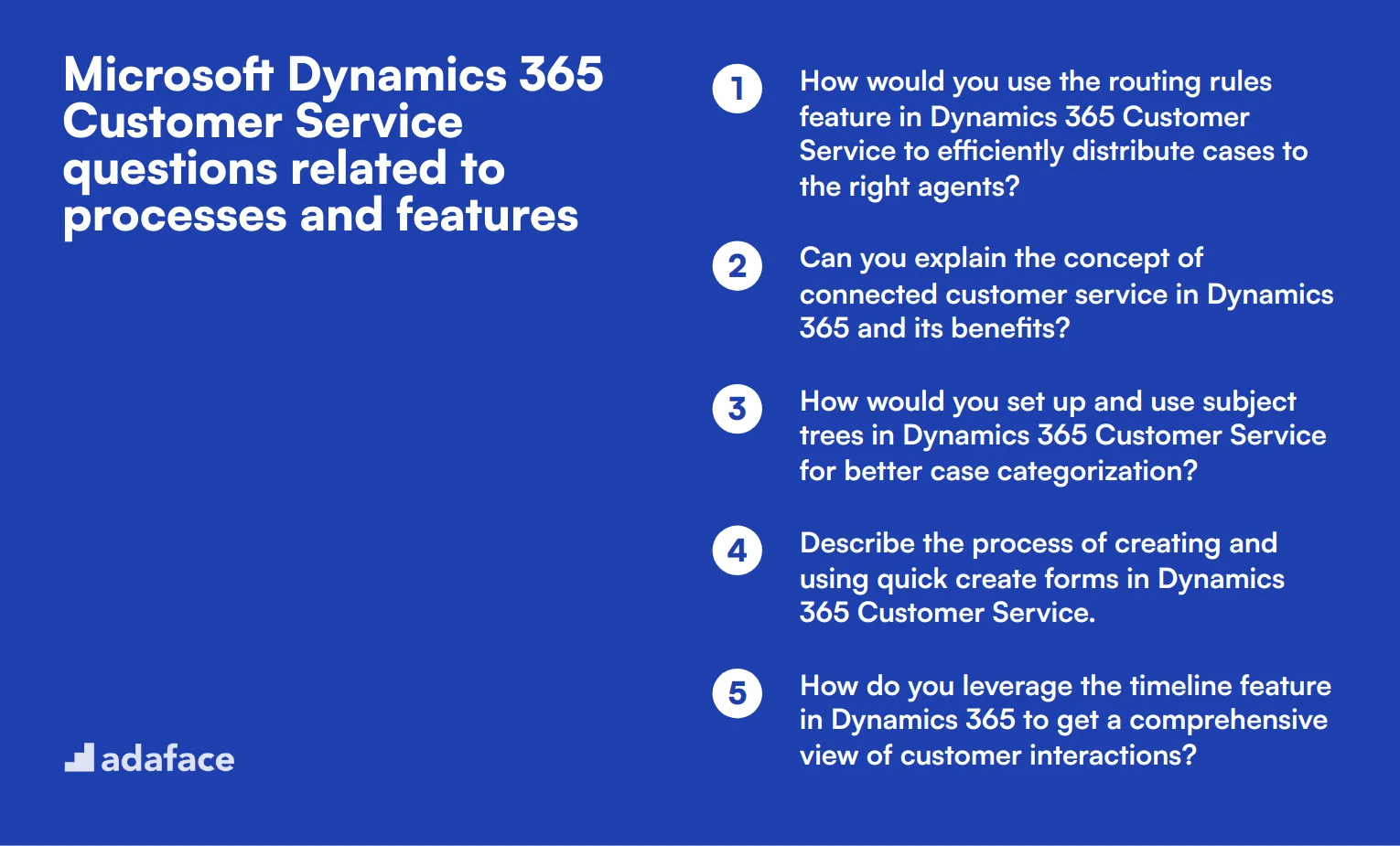
To assess candidates' practical knowledge of Microsoft Dynamics 365 Customer Service processes and features, use these interview questions. They'll help you gauge how well applicants can leverage the platform's capabilities to enhance customer service operations and drive efficiency.
- How would you use the routing rules feature in Dynamics 365 Customer Service to efficiently distribute cases to the right agents?
- Can you explain the concept of connected customer service in Dynamics 365 and its benefits?
- How would you set up and use subject trees in Dynamics 365 Customer Service for better case categorization?
- Describe the process of creating and using quick create forms in Dynamics 365 Customer Service.
- How do you leverage the timeline feature in Dynamics 365 to get a comprehensive view of customer interactions?
- Can you explain how to use the similar case suggestions feature to improve case resolution efficiency?
- How would you configure and use the customer voice surveys in Dynamics 365 Customer Service?
- Describe the process of setting up and using virtual agents in Dynamics 365 Customer Service.
- How do you use the case merge functionality in Dynamics 365 to handle duplicate cases?
- Can you explain how to set up and use the service scheduling feature in Dynamics 365 Customer Service?
- How would you leverage the Dynamics 365 Customer Service mobile app to improve agent productivity?
- Describe how you would use the knowledge assessment feature to ensure agent proficiency.
10 Microsoft Dynamics 365 Customer Service questions related to integration and customization
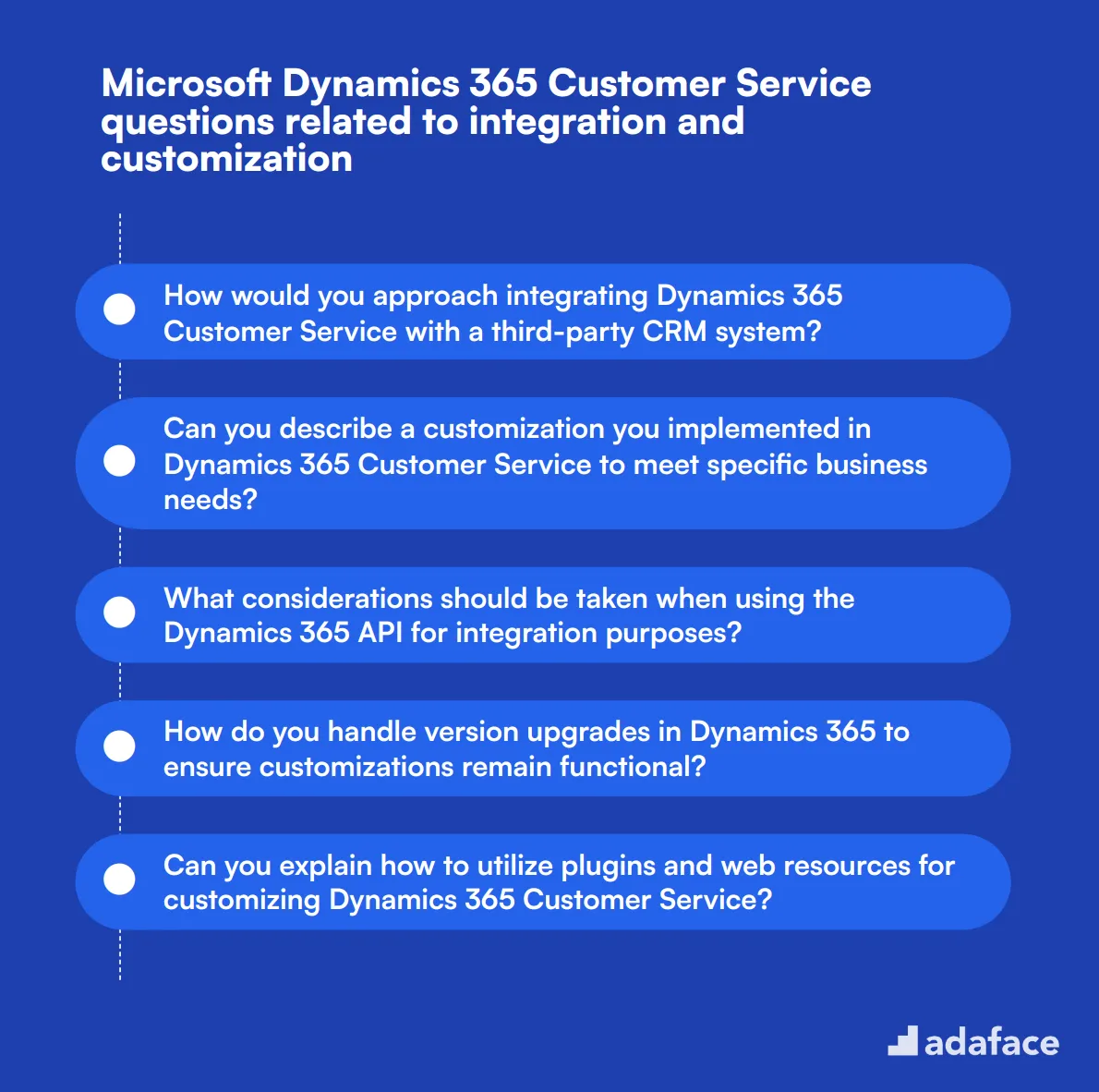
To assess a candidate's ability to effectively integrate and customize Microsoft Dynamics 365 Customer Service, consider using these targeted questions. They can help you gauge their technical skills and practical knowledge related to enhancing customer service operations. For insights on the essential skills for various roles, check out our customer service manager job description.
- How would you approach integrating Dynamics 365 Customer Service with a third-party CRM system?
- Can you describe a customization you implemented in Dynamics 365 Customer Service to meet specific business needs?
- What considerations should be taken when using the Dynamics 365 API for integration purposes?
- How do you handle version upgrades in Dynamics 365 to ensure customizations remain functional?
- Can you explain how to utilize plugins and web resources for customizing Dynamics 365 Customer Service?
- How would you create and manage custom entities in Dynamics 365 Customer Service?
- What strategies would you use to test customizations made in Dynamics 365 Customer Service?
- How do you ensure that customizations in Dynamics 365 comply with organizational policies and best practices?
- Can you walk me through the process of setting up integration with external databases using Dynamics 365?
- What challenges have you encountered in customizing Dynamics 365 Customer Service, and how did you overcome them?
Which Microsoft Dynamics 365 Customer Service skills should you evaluate during the interview phase?
While it's impossible to fully gauge a candidate’s capabilities in a single interview, focusing on key skills related to Microsoft Dynamics 365 Customer Service can provide significant insights. Identifying these core skills helps ensure that candidates are not only proficient in technical aspects but also possess the aptitudes necessary for exceptional customer service management.
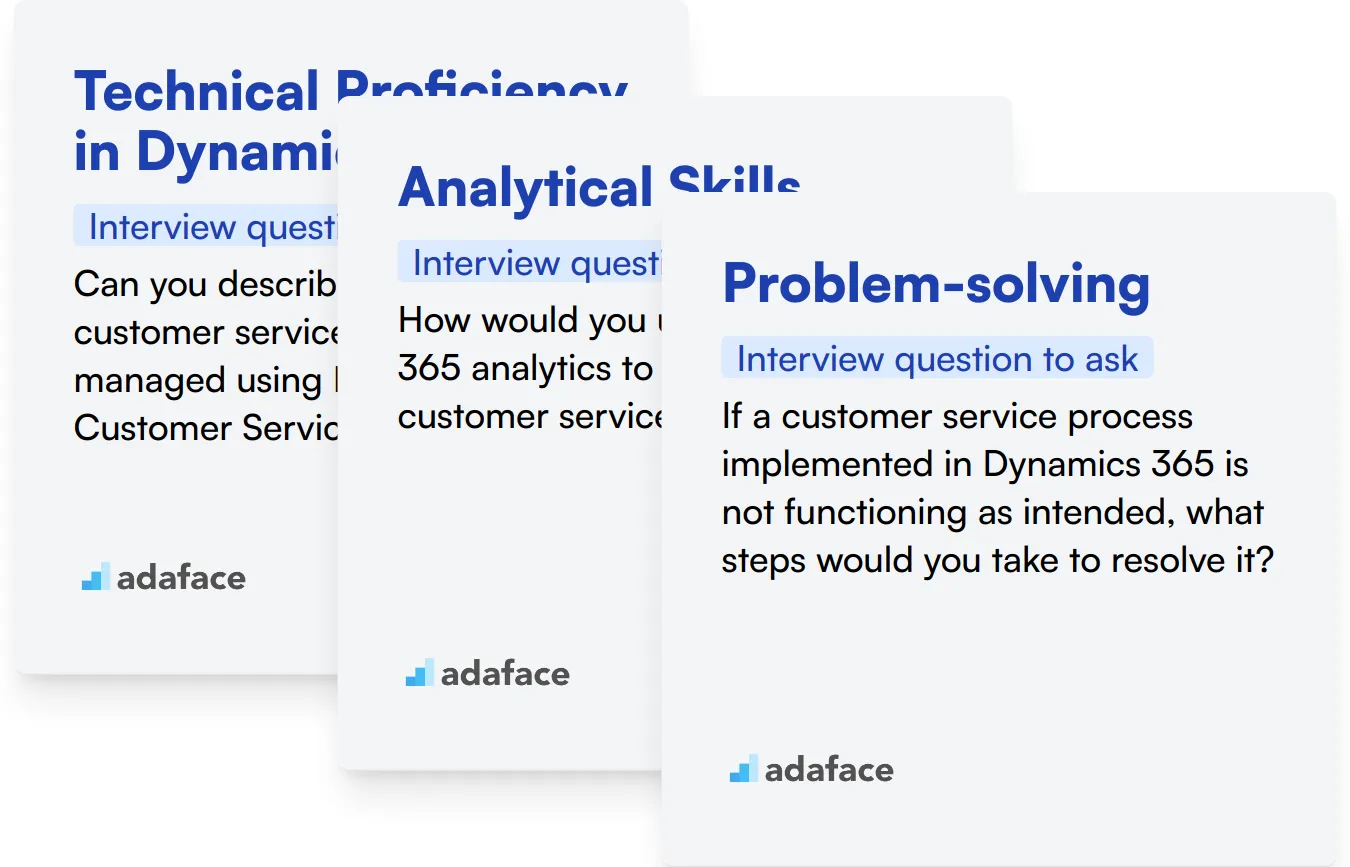
Technical Proficiency in Dynamics 365 Customer Service
Technical proficiency with Dynamics 365 Customer Service is fundamental. Candidates must understand the platform’s functionalities to efficiently manage customer interactions and data. This expertise directly impacts the quality of service provided to end-users.
For a thorough initial assessment of this skill, consider using a Dynamics 365 Customer Service test that challenges candidates with relevant multiple-choice questions.
During the interview, specific questions can help evaluate the candidate’s hands-on expertise with the platform.
Can you describe a challenging customer service scenario you managed using Dynamics 365 Customer Service?
Look for detailed descriptions that demonstrate the candidate's ability to navigate complex functionalities and provide effective solutions.
Analytical Skills
Analytical skills are critical as they enable specialists to assess customer data and generate insights that drive business improvements. This competency ensures candidates can leverage Dynamics 365 tools to support data-driven decision-making.
To dig deeper into this skill, pose scenarios that require analysis and interpretation of data within Dynamics 365.
How would you use Dynamics 365 analytics to improve our customer service response times?
Effective answers should include specific analytical tools and strategies that optimize operational efficiency.
Problem-solving
Effective problem-solving is synonymous with outstanding customer service. Specialists must quickly identify issues and implement solutions within the Dynamics 365 environment to maintain high satisfaction levels.
To assess problem-solving skills, present candidates with a realistic problem they might encounter while using the Dynamics 365 platform.
If a customer service process implemented in Dynamics 365 is not functioning as intended, what steps would you take to resolve it?
Look for a structured approach to troubleshooting, including clear steps and contingency plans.
Hire Top Microsoft Dynamics 365 Customer Service Talent with Skills Tests and Targeted Questions
When hiring for Microsoft Dynamics 365 Customer Service roles, it's important to verify candidates' skills accurately. This ensures you bring on board team members who can truly contribute to your customer service goals.
A practical way to assess these skills is through targeted tests. The Microsoft Dynamics 365 Customer Service Functional Consultant Test can help you evaluate candidates' knowledge and abilities in this area.
After using this test to shortlist top applicants, you can invite them for interviews. The questions provided in this post will help you dive deeper into their experience and problem-solving skills during the interview process.
Ready to streamline your hiring process for Microsoft Dynamics 365 Customer Service roles? Sign up to access our test library and start evaluating candidates more effectively today.
Microsoft Dynamics 365 Customer Service Functional Consultant Test
Download Microsoft Dynamics 365 Customer Service interview questions template in multiple formats
Microsoft Dynamics 365 Customer Service Interview Questions FAQs
Key skills include familiarity with Dynamics 365 features, problem-solving, communication skills, and experience in customer service processes.
Ask specific questions about their previous projects involving integration and customization, and request examples or case studies.
It helps to gauge the candidate's hands-on experience and their ability to navigate and utilize the platform effectively.
Focus on foundational knowledge of Dynamics 365, basic customer service skills, and their willingness to learn and grow.
Evaluate their advanced problem-solving skills, strategic thinking, and their experience with complex Dynamics 365 functionalities.
Yes, skills tests provide a practical assessment of the candidate's abilities, ensuring they can perform the required tasks effectively.

40 min skill tests.
No trick questions.
Accurate shortlisting.
We make it easy for you to find the best candidates in your pipeline with a 40 min skills test.
Try for freeRelated posts
Free resources




